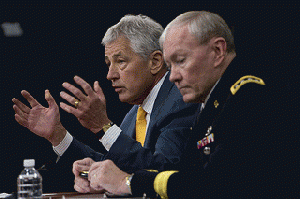Reprinted from WSWS

Joint Chiefs of Staff Chairman Gen. Martin Dempsey and US Secretary of Defense Chuck Hagel
(Image by Secretary of Defense) Details DMCA
Washington's top uniformed commander has called for US military "advisers" to be deployed in Iraq's predominantly Sunni Anbar province, where the Islamist insurgents of the Islamic State of Iraq and Syria (ISIS) have captured some 80 percent of the territory.
The proposal put forward Thursday by Joint Chiefs of Staff Chairman Gen. Martin Dempsey would mean sending American troops into combat, despite the repeated assurances from President Barack Obama and other administration officials that the new US war in the Middle East will involve no American "boots on the ground."
Dempsey, who according to recent media reports played a key role in persuading Obama to launch the war in Iraq and Syria, had previously stated that he would not hesitate in recommending that US special operations troops be sent into action alongside Iraqi government forces if he felt they were needed, regardless of Obama's assurances to the contrary.
He now seems to be doing just that. Appearing at a joint Pentagon press conference with US Secretary of Defense Chuck Hagel, Dempsey was asked about the mass killings of Sunni tribe members in western Anbar province at the hands of ISIS. Some 400 members of the Abu Nimer tribe had reportedly been slaughtered by ISIS over the previous 48 hours. Apparently fearing a revolt against their control of the Iraqi city of Hit, the Islamists rounded up former Iraqi police officers and others believed to have ties to the government.
The tribe had been involved in the so-called "Awakening" or "Sons of Iraq" movement that was initiated in 2005-2006 by the US military occupation. It paid salaries to Sunni tribe members to patrol their neighborhoods and combat Al Qaeda-linked insurgents in Anbar, which was the scene of some of the bloodiest combat in the nearly nine-year US war.
The Shia sectarian government of Prime Minister Nouri al-Maliki, which was installed by Washington, stopped payments to the militias and ordered that they be disbanded.
This was part of a general crackdown on the Sunni population that led to a low-level insurgency in Anbar. This revolt in turn created the conditions for ISIS to seize up to one third of Iraq's territory from US-trained Iraqi forces, which collapsed in face of the Islamist fighters.
Asked about the recent mass killings, Dempsey responded: "That's what we're dealing with. That's why we're engaging the Sunni tribes. Yes, these things are happening. Yes, it's difficult. Yes, we're dealing with it."
The general's proposal appeared to be directed at reviving the "Awakening" movement under the direction of US "advisers."
In explaining the recent massacre, the senior US commander said that Iraqi forces in Anbar "are in defensive positions and would be unlikely to be able to resound to a request for assistance for the Abu Nimer tribe." He added that he was "not aware" of any request for US air strikes in the area.
"What I can say is that's why we need to expand the train-advise-and-assist mission into Al Anbar Province," he declared. "But the precondition for that is that the government of Iraq is willing to arm the tribes."
Currently, these "train-advise-and-assist" operations are restricted to the Iraqi capital of Baghdad and the Kurdistan Regional Government capital of Erbil, both removed from any direct combat. This is what the US military aims to change. There are 12 US advisory teams, seven deployed in a joint operations center in Baghdad and five at a similar facility in Erbil.
"There's three components to the train-advise-assist mission," Dempsey said. "Initially, the Iraqi security forces, and I include in that the Peshmerga, so north and south, mostly oriented around Baghdad and Erbil, and then there's the issue of the tribes and trying to find a way to engage and power -- or enable them.
"And that's what we're now beginning to explore. We've got a program in place where we're beginning to restore some offensive capability and mindset to the Iraqi security forces. We need to think about how to do that with the tribes."
The third component he listed was the creation of a "national guard," a proposal that would essentially create militias under the control of provincial governors. Many have warned that setting up such forces will only accelerate Iraq's disintegration along sectarian lines and result in a further descent into civil war.
(Note: You can view every article as one long page if you sign up as an Advocate Member, or higher).




